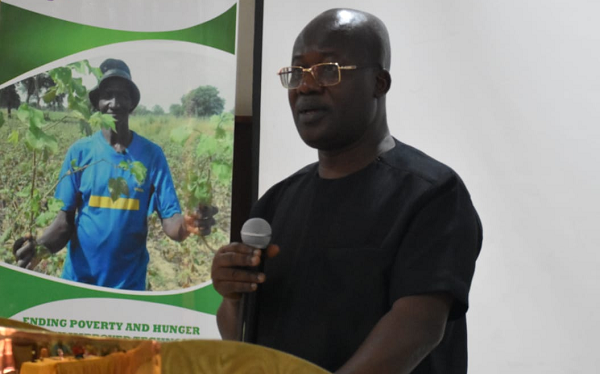Professor Eric Yirenkyi Danquah, a Ghanaian plant geneticist and the founding director of the University of Ghana’s West Africa Centre for Crop Improvement (WACCI), believes that smallholder farmers in Africa need biotech crops more than farmers anywhere else in the world.
According to him, the time has come for African governments to use data on biotech solutions to make decisions that will improve livelihoods and help millions of Africans escape extreme hunger and poverty.
“Anti-GMO agitation has slowed the acceptance of genetically altered crops in many nations,” he said, “contributing to the continuance of dangerous pesticide use, hunger, and poverty.”
Prof. Danquah made the statements at a training session in Accra on Wednesday, May 11, 2022, for scientists, graduate students conducting agricultural biotechnology research, researchers, undergraduate students studying agriculture and allied programs, communicators, and agricultural stakeholders.
Background
The event, entitled “Speaking Scientific Ghana” and organized by Alliance for Science, a science communication effort, aimed to provide participants with effective communication skills that they might use to educate the public about GMOs and agricultural biotechnology.
The course also aimed to provide participants with the most up-to-date skills in using the media to communicate about science, such as writing opinion pieces, doing media interviews, and using digital media tools.
Alliance for Science is a science communication campaign dedicated to promoting science around the world while combating disinformation about scientific discoveries and topics like GMOs, genome editing, COVID-19, and climate change.
Why are GMOs used?
Prof. Danquah stated that just seven African countries have accepted genetically modified organisms (GMOs), but that GMOs were in various phases of development in 11 other African countries, including Ghana.
“Improved varieties of our staple crops with high yields and resistance to physical and biological challenges are essentially necessary for a green revolution and food self-sufficiency in Ghana,” he said.
He emphasized that science-based agriculture might help conserve important indigenous staples like cowpea, millet, cassava, and sorghum while also lowering farming’s environmental impact.
“On average, genetically altered crops have reduced chemical pesticide use by 37%, raised agricultural yields by 2%, increased farmer profit by 38%, and reduced greenhouse gas emissions equivalent to removing 12 million cars from the road,” Prof. Danquah stated.
He argued that farmers all over the world were suffering from the devastating effects of climate change, citing disruptions in rainfall patterns, drought, extreme weather events, pest infestations, plant diseases, crop losses, and hunger as reasons for African governments to adopt biotech solutions like GMO crops.
“Let us not allow regulatory delays to prevent millions of farmers from obtaining this life-saving technology,” he said, adding, “Better seeds generated through genetic engineering give hope.”
Action is required immediately.
Prof. Danquah has so-called for incorporating fast-expanding modern biotechnology technologies, such as genome editing, into crop enhancement programs to make agriculture “more productive and sustainable” in Ghana.
“Ghana needs a comprehensive scientific strategy that puts research on the top of the agricultural transformation agenda,” he said, urging the government to offer farmers the freedom to choose and embrace crops developed via modern science in plant breeding, including GM technology.
“This can be performed with accuracy and efficiency using plant biotechnologies and genomics as crucial instruments,” he said, adding that biotech solutions and advances enable scientists to solve agricultural challenges that conventional farming methods were unable to manage.
Prof. Danquah highlighted that biotech technologies protected crops from insects and weeds, two important concerns that reduce crop yields and cause crop failure all over the world.
Misinformation
“It has been 27 years since the first GMOs were issued, and I am not aware of a single credible food or feed problem on the safety of GMOs,” he said, expressing alarm about the spreading misconceptions regarding GMO crops in the country.
“There is a very solid scientific consensus on GMOs globally, just as there is on climate change,” he added.
Despite the fact that scientific official papers on the safety and benefits of GMOs had been published by the World Health Organization, Prof. Danquah was concerned.
Despite the efforts of organizations such as the World Health Organization, the Food and Agriculture Organization, the National Academy of Sciences (USA), the Royal Society (UK), the American Medical Association (USA), the French Academy of Medicine, the European Commission, the US Food and Drug Administration, the Society of Toxicology, and the Institute of Food Technology to dispel myths about genetically modified organisms, some uninformed individuals continue to spread misinformation about GMOs.

